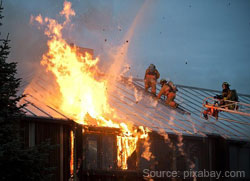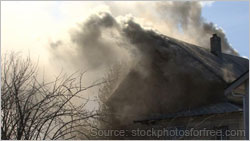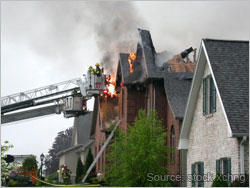 A house fire is an incredibly tragic event for any family to endure. The loss of your most treasured belongings, the damage to or destruction of your home, and the frightening threat to your life it can pose are all devastating things to experience. In the wake of a detrimental house fire, you will need to begin your claim with your insurance company, find a way to cope with your loss, and ask for assistance in your time of displacement. This guide will explain the necessary steps to take immediately following the fire, and what resources you can turn to for help.
A house fire is an incredibly tragic event for any family to endure. The loss of your most treasured belongings, the damage to or destruction of your home, and the frightening threat to your life it can pose are all devastating things to experience. In the wake of a detrimental house fire, you will need to begin your claim with your insurance company, find a way to cope with your loss, and ask for assistance in your time of displacement. This guide will explain the necessary steps to take immediately following the fire, and what resources you can turn to for help.
What to Do
Make sure it's safe.
Do not reenter your home unless the fire department assures you that it is safe to return. Fires can reignite even after they appear to be out, and floors and roofs can be severely damaged and collapse. The fire department will also make sure that your utilities (gas, water, and electric) are safe to use, and will disconnect them if they are not. If so, do not attempt to reconnect them yourself--this could be highly hazardous. Do not eat or drink anything that was in your home. It may have been contaminated by the soot, dirty water, or smoke and could make you ill.
Contact your insurance company.
Notify your insurance company about the fire right away. Ask them what you should handle first and what steps you should take in cleaning up your home and documenting the damage. This may include pumping out water, covering your doors and windows, and making a detailed list of the items lost in the fire and how much they were worth. Finding out exactly how you should proceed in the aftermath of the blaze will facilitate your claims process. Your insurance company may also be able to help you with lodging needs, clean-up assistance, and other expenses. Remember to save all receipts during this time.
Obtain a copy of the fire report.
A fire report will contain all the details of the fire, such as the structure and condition of your home, the neighborhood in which it is located, the date and time of the fire and the expected cause of the blaze. You can get a copy of this document from the fire department or the office of the fire marshal. You will need this report to file your claim with your insurance company.
Secure your property.
Most insurance companies will require you to board up doors, windows, or other openings to prevent looting and additional damage. Contact the police to notify them that your home will be vacant for a length of time.
Start the clean-up process.
Depending on the extent of the damage to your home, you may need to hire professionals that specialize in the clean-up and restoration of fire-damaged belongings. Find out from your insurance agent if your policy covers this expense. Ask your agent for recommendations for a reputable company and get any estimate given to you in writing. These companies often offer the following services:
 securing your home (boarding it up)
securing your home (boarding it up)
- estimating the cost of and repairing structural damage
- estimating the cost of restoring damaged personal items
- storing repaired items
- hiring cleaning or repair subcontractors
- structural clean-up
- contents cleaning
Make sure to keep an inventory of any belongings removed from your home by the clean-up company.
Get finances in order.
If you have lost any credit cards in the fire, contact your credit card company to report them and to request replacements. You should also contact your mortgage lender or landlord as soon as you can. Be sure to keep all of your receipts for your expenses during this time. You will need them to prove to your insurance company what you have spent related to your loss. You may also need them if you intend to claim anything on your income taxes.
Replace important documents.
You will need to begin replacing any important documents that were lost in the fire. Some examples of these include:
- driver's license
- car registration
- medical records
- Social Security cards
- mortgage papers
- insurance policies
- marriage certificates
- birth certificates
- wills
- death certificates
- divorce papers
- school records/diplomas
- deeds
- titles
- tax records
- passports
- visas
- citizenship papers
- checkbooks/bankbooks
- stocks and bonds
Who Can Help?
There are many groups and organizations that can provide aid to families displaced by a house fire. You can use these resources to receive food, clothing and even shelter. The following are a few places you can turn in this time of tragedy:
Churches
 Even if you are not a member of a particular parish, most churches will help you in times of disaster. They can help you find a place to stay, collect food and clothing donations from the congregation, or hold fundraisers for you. Visit your local church and speak to the pastor or another member to find out how to get the help you need.
Even if you are not a member of a particular parish, most churches will help you in times of disaster. They can help you find a place to stay, collect food and clothing donations from the congregation, or hold fundraisers for you. Visit your local church and speak to the pastor or another member to find out how to get the help you need.
Red Cross
The Red Cross responds to about 70,000 disasters a year, from hurricanes and earthquakes that affect thousands to home fires that affect a single family. The Red Cross can provide food, shelter, healthcare and counseling services to families impacted by tragedy and loss. Their network of donors, volunteers and workers exist to provide compassionate relief to those in need.
Salvation Army
This charitable Christian organization can provide aid in the form of housing options, groceries, medical assistance, donated goods and counseling. The agency trains disaster volunteers year-round to provide relief to families struggling in the aftermath of catastrophe.
Social Services
Social services can advise you on how and where you can receive assistance in your area for housing, bills, food, medical care, and counseling. Simply dial 211 from your landline phone and speak with a case worker. They may ask you several questions regarding your location, income, etc. Tell the case worker about your situation and what you need help with, and they will provide you with referrals to agencies that can get you the aid that you need.
Freecycle
Freecycle is a website where users can post items that they would like to donate or ask for the things that they need. Freecycle is active in all 50 states, and has listings for clothing, furniture, beds, and many other household goods that you may need to replace after your fire. The website is completely free to use, but use discretion when communicating with and making exchanges with other members. The website holds no liability for any circumstances resulting from the donations made through the site.